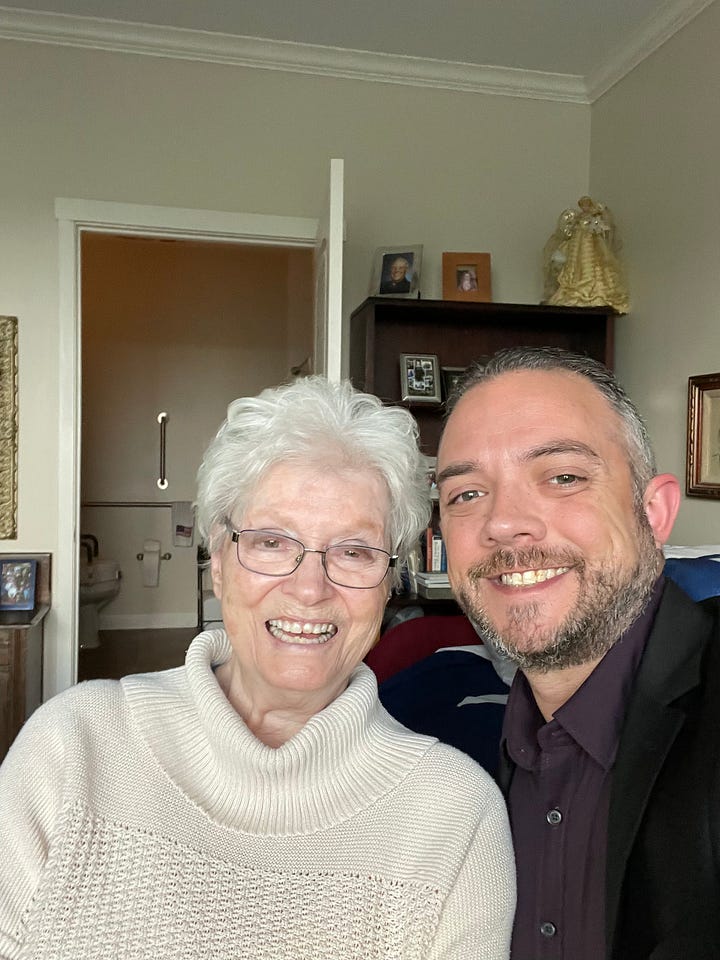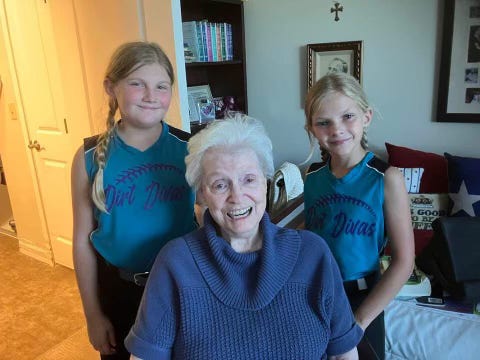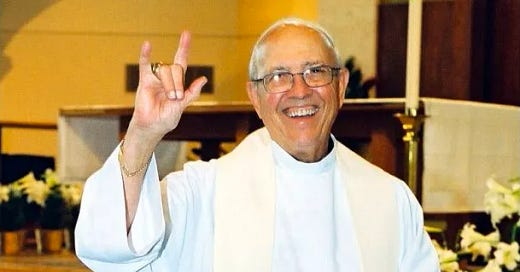Ted and Lee Ann Nelson - The Christ Church Stories, Part Three, Episode 4
A retired priest and his wife came and stayed
An Extra Set of Hands
When we started Christ Church, I was just 29 years old. Young enough to believe it could be done, but too young, really, to be in charge of a growing church. I had fire and energy, sure, but not a lot of credibility.
That changed when Fr. Ted Nelson showed up.
It was Shrove Tuesday, a few years after we’d moved into our first building. I was between clergy again. Finding and keeping associate staff was always a challenge. Most had their own dreams and ministry blueprints. I needed someone who would serve, not scheme.
There was a knock on the church door.
It was Father Ted Nelson.
He’d come to see me about a national board we both served on, but it was more than a courtesy call. He said he’d come to return the favor. Years earlier, I had gone to Garland to visit him to learn how he had grown the Church of the Resurrection into one of the Episcopal Church’s leading parishes. Now he wanted to know how Christ Church was doing.
We talked for a while, shook hands. He prayed for me—his hands always trembled when he prayed, like the Holy Spirit was coursing through his fingers—and then he left.
Ten minutes later, another knock.
“David,” he said, “are you out here all alone?”
I looked around and said, “Yeah.”
“You don’t have any clergy help?”
“No.”
He paused, then smiled. “Lent’s coming. You might could use an extra set of hands.” I could! Our attendance was pushing up to 500.
That was Ted’s way. Casual but decisive. Helpful without being pushy. And I said yes immediately. Having Ted Nelson on staff wasn’t just a blessing. It was validation. It made me believable.
Ted gave me credibility I hadn’t yet earned. He offered encouragement, wisdom, and something more—honesty.
Whenever I came to him with a situation, he’d say things like, “Well, David, let me tell you how I screwed that one up.” Or he’d drawl, “Well, David, let me tell you how the cow eats the cabbage.” He had an endless supply of Texas euphemisms, which became part of his spiritual counsel. It was like getting mentored by Yoda if Yoda had a southern drawl and a clerical collar.
From Marketing to Ministry
Before he was a priest, Ted worked in advertising. He was the brand manager for Wolf Brand Chili and came up with their famous line: “How long has it been since you’ve had Wolf Brand Chili? Well, that’s too long.” He eventually left marketing, followed a call to ministry, and enrolled at Virginia Theological Seminary with his wife, Lee Ann. After graduation, they returned to Texas.
Ted served a small parish in Garland until he was baptized in the Holy Spirit, and then everything changed. The Church of the Resurrection caught fire. It became one of the anchor churches of the charismatic renewal in the 1970s. Ted became a fixture. He was nationally respected, locally beloved, a man of the Spirit who never made a show of it.
He served on staff at Christ Church for 25 years.
Ted was more than just a set of hands. He was like a spiritual father to me and to many. For years, he was the chaplain to the staff. I knew they needed to have someone to listen to them—their frustrations, prayer concerns, and the challenges of being on the team of a growing church.
But I knew that Ted was as loyal to the vision of Christ Church as I ever hoped for. I trusted him completely.
Ted was a High Churchman, as were most clergy in the Dallas area. I was the outlier. However, Ted never complained or pushed me one way or the other. Many people who have had the kind of ministry he had—rector of a large, well-known church, speaking ministry, international figurehead of important ministries—find it challenging to operate under another leader's vision.
Not Ted. He was quite comfortable in the second chair, or third, fourth, or fifth.
Fran and I felt Ted and Lee Ann’s love and support in tangible ways. They told us they prayed for us, and we were sure it was true. It wasn’t just a passing comment, a throwaway. They were partners.
He was part mentor, part spiritual father, part fixer. Sometimes I’d call him “the closer”—he could help families feel like Christ Church was where they belonged. Other times, he’d take on the awkward, hard conversations that needed to be had, but that I dreaded. His presence was ballast. Year by year, he stayed. And year by year, I realized how rare that kind of presence is.
A Running Joke
Wherever I traveled—Jerusalem, London, California, Chicago—I’d meet someone who didn’t know me, didn’t know Christ Church, but they knew Ted Nelson.
In 1994, I was at Christ Church in Jerusalem. During the greeting part of the service, I turned to shake hands with a bishop behind me.
“Where are you from?” he asked.
“Dallas.”
He brightened. “The only person I know in Dallas is Ted Nelson!”
I smiled. “Ted Nelson’s on my staff,” I said, dropping the name.
He looked surprised. “I’ve never heard of you at all.”
Ted’s name opened more doors than mine ever had. Or would.
Another time, I was in Dallas attending a conference. I sat next to a middle-aged Pentecostal minister from out of town. We shook hands, and he asked about me. I told him I was the rector of Christ Church in Plano. He shrugged. Then he said, “The only person I know in Dallas is Ted Nelson.” I smiled and pressed the advantage. I said, “Yeah, well, Fr. Ted is on my staff!”
He paused, shook his head, and came back at me with this line: Fr. Ted is on your staff? What? That’s like having FDR on your cabinet…and you’re Bill Clinton!
He slapped my back. I had no idea what he meant, but it told me again that I had a legend for a friend and mentor.
The Fastest Chalice in Dallas
A few members occasionally asked me when Fr. Ted would celebrate the Eucharist because they wanted to attend his service. I inquired why, and the answer was often that he said the Eucharistic prayers quickly. I later learned from an old-timer in the diocese that Ted was known as the “Fastest Chalice in Dallas.”
In his later years, dementia crept in. He still came to church and asked if he could preach. He’d say, “David, I just have to tell them about the Holy Spirit. They just have to know.”
I’d hug him and say, “Ted, I love you. But I can’t put you up there again. You’d lose your place, and I don’t want you to feel embarrassed.”
I’m not sure that was the right call to make.
He died not long after. I had the honor of preaching at his funeral. Listen to it if you have a few minutes.
Lee Ann Nelson
Fran and Lee Ann were close for years. After Ted died, Lee Ann lived alone. Fran and Lee Ann get together weekly for conversation and prayer. Eleven years later, every week, Fran drives to Lee Ann’s small assisted living studio in Allen. That’s just who my wife is: steady, caring, and quietly loyal.
About seven years ago, Fran talked to me about Lee Ann. She was struggling. Her power chair was barely enough. Meals were hard. So was making tea. Life seemed to be slipping out of reach.


Her daughter and grandkids were nearby and attentive. Her son had distanced himself from her. She didn’t know why. Neither did I. But what she needed was clear: someone to manage her money, handle her affairs, and step in with legal authority when needed.
She looked at me and asked, gently and without embarrassment, “Would you be that for me?” I said yes before she finished the sentence.
We sold her house. Sold her car. Found a place for her in a 15-by-15-foot studio. That week, I sorted through Ted’s old files. His sermons—handwritten. His letters to the bishop. Clippings he kept for illustrations. Boxes of books and Longhorn memorabilia. All of it had to be read, remembered, or released.
Fran did the same with Lee Ann’s things. Her clothes. Her Braniff keepsakes—she was a stewardess. Albums, blankets, decades of records and receipts. Everything that accumulates in a life well lived.
At one point, I turned to Lee Ann’s daughter and said, “I’ll do right by your mom. I’ll treat her the way I wish I could’ve treated mine.”
And I have.
My own mother later slipped into dementia. The story of her decline is for another time. She died before I could care for her the way I’d hoped. So I gave that care to Lee Ann. Every bit of it.
She became the mother I didn’t get to finish loving. And it’s been a joy—an actual joy—to love her, protect her, and be her guardian. She’s been a blessing to Fran and me for many years.
At the end of Romans, Paul signs off with a long list of greetings. One line has always stayed with me: “Greet Rufus, and his mother—who has been a mother to me, too.”
That’s the line. That’s Lee Ann. The woman who wasn’t my mother, but is like a mother to me. The kind who smiles when you show up, never minds when you leave, and still says you’re the best thing to walk through the door.
Remembering
Many of you reading this may know Lee Ann . She’s 93 now, confined to a power chair but sharp as ever. She is a delight to talk to. Her wits and insight are intact, and her heart is full of grace. It is our privilege for Fran and me to be part of her circle of care.
If you remember her fondly, maybe you’d like to send her a little something. I’ll include a link below. Whatever is given will go toward a bouquet of fresh flowers, which Fran and I will deliver to her in person. She deserves that and more.
People often forget those who move into assisted living. But Lee Ann Nelson is a woman who should never be forgotten. I never will.
Grace and Peace
David Roseberry ☩
The Anglican
The Anglican is the Substack newsletter for LeaderWorks, where I share insights, encouragement, and practical tools for clergy and lay Christians. I’m also an author of over a dozen books available on Amazon.
If you are a Paid Subscriber, thank you! Thank you for supporting The Anglican and the ministry of LeaderWorks. If you are not a subscriber, please consider becoming one today.








I loved Fr. Ted's sermons - they could be absolute stream of consciousness. When he'd walk up to the lectern, my wife and I would look at each other: "Okay, fasten your seat belt." If you blinked, you'd miss at least four Scriptural truths. And yet somehow within the frenetic pace, there was calm. How did he do that?
I loved Fr.Ted. I described him as “the confessor to the Choir” to people outside the church although I later learned he was much more than that.
He also knew when to joke and when to be serious. As a brand new member, I asked if if he thought committing to praying the Daily Office was a good Lenten discipline. “That’s a big job. You should consider carefully if you can keep that promise.”
Another time when I was joking with him he answered deadly serious: when I joked another year about “giving up work for Lent”, he replied “what you really have to ask yourself is ‘does this thing I want to give up bring glory to God?’, if doesn’t, then you should reconsider your Lenten discipline.”
Contrast that with the “down home humor” when he recognized it was time to have fun. One year when we sang a particular hymn to close a service, I asked him “can we as Good Southern Men sing The Battle Hymn of the Republic?” He saw the smile on my face and gave me a very good punch line “I think it’s been long enough that we can get away with it now.”
Even in a joke, there was a lesson and a challenge. I went back and studied the Battle Hymn and what it truly meant. Canon Mark may not remember the exchange, but when a fellow choir member asked one year if we could change the last line to “live” instead of “die to make men free”, I protested loudly telling her that changing one word changed the entire meaning of the song. Canon Mark shut the discussion down with a quiet “we sing it as written.”
Thank Fr. Ted for that.